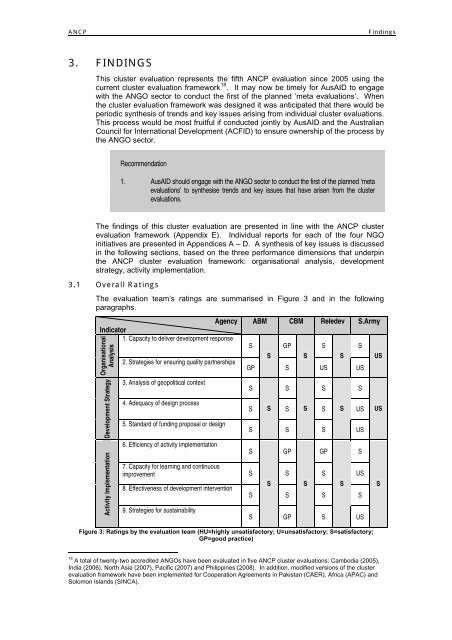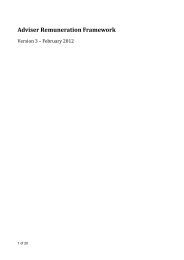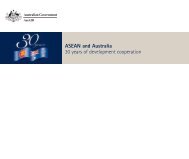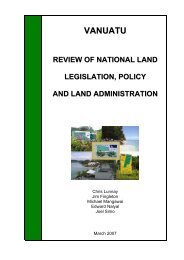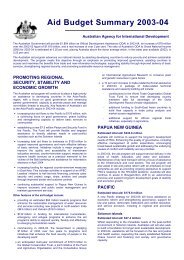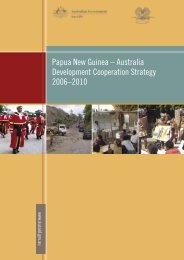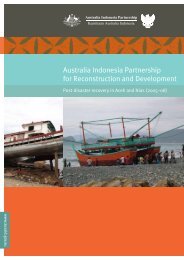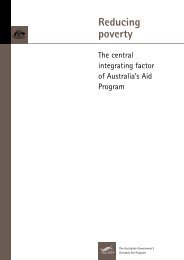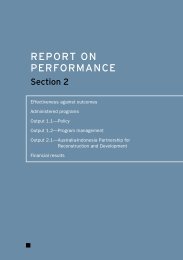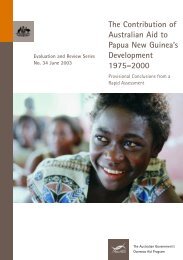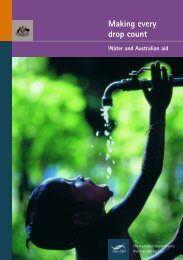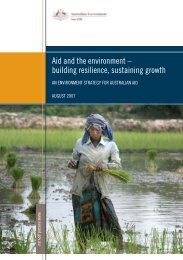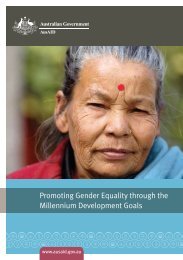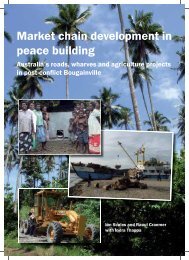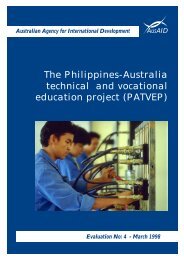ANCP Philippines Cluster Evaluation Report - AusAID
ANCP Philippines Cluster Evaluation Report - AusAID
ANCP Philippines Cluster Evaluation Report - AusAID
You also want an ePaper? Increase the reach of your titles
YUMPU automatically turns print PDFs into web optimized ePapers that Google loves.
<strong>ANCP</strong>Findings3. FINDINGSThis cluster evaluation represents the fifth <strong>ANCP</strong> evaluation since 2005 using thecurrent cluster evaluation framework 18 . It may now be timely for <strong>AusAID</strong> to engagewith the ANGO sector to conduct the first of the planned ‘meta evaluations’. Whenthe cluster evaluation framework was designed it was anticipated that there would beperiodic synthesis of trends and key issues arising from individual cluster evaluations.This process would be most fruitful if conducted jointly by <strong>AusAID</strong> and the AustralianCouncil for International Development (ACFID) to ensure ownership of the process bythe ANGO sector.Recommendation1. <strong>AusAID</strong> should engage with the ANGO sector to conduct the first of the planned ‘metaevaluations’ to synthesise trends and key issues that have arisen from the clusterevaluations.The findings of this cluster evaluation are presented in line with the <strong>ANCP</strong> clusterevaluation framework (Appendix E). Individual reports for each of the four NGOinitiatives are presented in Appendices A – D. A synthesis of key issues is discussedin the following sections, based on the three performance dimensions that underpinthe <strong>ANCP</strong> cluster evaluation framework: organisational analysis, developmentstrategy, activity implementation.3.1 Overall RatingsThe evaluation team’s ratings are summarised in Figure 3 and in the followingparagraphs.AgencyIndicator1. Capacity to deliver development responseOrganisationalAnalysisDevelopment StrategyActivity Implementation2. Strategies for ensuring quality partnerships3. Analysis of geopolitical context4. Adequacy of design process5. Standard of funding proposal or design6. Efficiency of activity implementationABM CBM Reledev S.ArmyS GP S SSSSGPSUSUSS S S SS S S S S S USSSSUSS GP GP S7. Capacity for learning and continuousimprovement S S S US8. Effectiveness of development interventionSSSS S S S9. Strategies for sustainabilityFigure 3: Ratings by the evaluation team (HU=highly unsatisfactory; U=unsatisfactory; S=satisfactory;GP=good practice)SGPSUSUSUSS18A total of twenty-two accredited ANGOs have been evaluated in five <strong>ANCP</strong> cluster evaluations: Cambodia (2005),India (2006), North Asia (2007), Pacific (2007) and <strong>Philippines</strong> (2008). In addition, modified versions of the clusterevaluation framework have been implemented for Cooperation Agreements in Pakistan (CAER), Africa (APAC) andSolomon Islands (SINCA).<strong>ANCP</strong> <strong>Philippines</strong> <strong>Cluster</strong> <strong>Evaluation</strong> <strong>Report</strong> (ver. 2.0) 6


